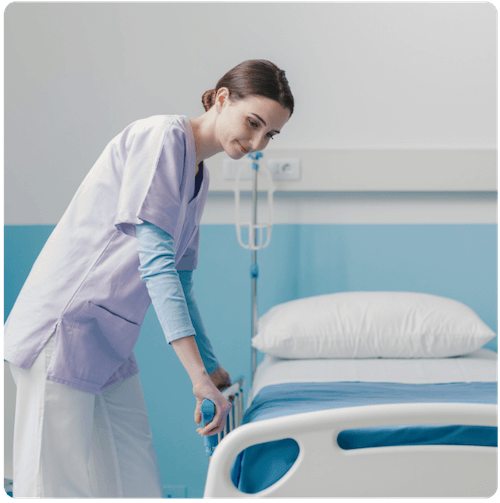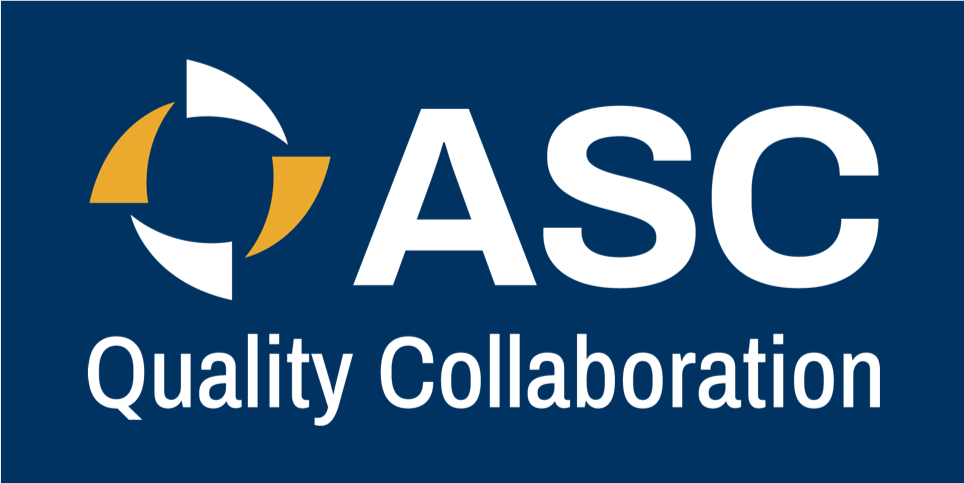Prevention of Patient Falls Toolkit
The resources in this toolkit may only be used for internal improvement and education efforts. They may not be used for commercial purposes.

To support the ASC industry’s focus on high quality care, the ASC Quality Collaboration has assembled an ASC Tools for Prevention of Patient Falls toolkit. All patients cared for in ambulatory surgery centers, not just older or frail individuals, may be at heightened risk for a fall due to the impact of the procedures and surgeries performed, as well as the attendant sedation, anesthesia, and/or analgesia involved in providing these services safely and comfortably.
Our goal is to make fall prevention resources and information readily accessible to ASCs by bringing them together in one location. These materials may be used to supplement your current processes to prevent patient falls. They include:
Implementation Tools
- Fall Prevention Policy and Procedure Template – This sample fall prevention policy and procedure is a starting point and may be adapted to reflect center conditions.
- Environmental Fall Risk Assessment (IHI) – Adapted from a resource available from the Institute for Healthcare Improvement, this is an example of an environmental assessment and should be adapted to reflect center conditions.
- Center Fall Prevention Evaluation – This document is an example of a method to assess center fall risk factors and determine what course of action is needed to address any issues that might be identified.
- Universal Fall Precautions Checklist – This checklist provides a sample list of items important to preventing falls. As universal precautions, these items are intended to apply to all patients seen in the center.
- Patient Fall Reduction Strategies – This tool provides examples of factors that contribute to falls and corresponding actions that may be implemented to reduce the risk of patient falls.
- Ophthalmology Falls Prevention Form – This document is an example of a falls prevention form for the ophthalmology setting.
- Information to Include in Incident Reports (AHRQ) – A modified version of an Agency for Healthcare Research and Quality resource, this document suggests key items to include in a fall incident reports.
- Action Plan Tool to Measure Fall Rates and Fall Prevention Practices (AHRQ) – This tool, adapted from a resource provided by the Agency for Healthcare Research and Quality, may be used to assess key indicators in the measurement of fall rates and fall prevention practices.
Patient Fall Risk Assessment Tools
- Morse Fall Scale – The Morse Fall Scale is a widely used and validated fall risk assessment tool for adult patients.
- Humpty Dumpty Scale – The Humpty Dumpty Scale is widely used for pediatric fall risk assessment. Though not specifically designed for the outpatient surgery setting, it does take the effects of surgery/sedation/anesthesia into account.
- Fall Risk Factor Assessment – This is an example of a fall risk factor assessment form used to assess risk on admission and later during the patient’s stay.
Patient Education Resources
- Fall Prevention Guidelines for Patients – This document may be used to educate patients pre-operatively about falls and center fall prevention guidelines.
- Falls Awareness and Prevention Guide (OTA/AAOS) – This abridged version of the guide published by the Orthopedic Trauma Association and the American Academy of Orthopedic Surgeons provides tips on measures patients may take to help fall-proof their home.
- Home Education for Patients at High Risk for Post-operative Falls – This document shares some items that may be helpful to prevent falls in patients who are at high risk for falls post-operatively.
Training Materials
- Fall Prevention Practices – This PowerPoint presentation is an example of a staff presentation that discusses fall prevention practices in the center. It should be adapted so that it is appropriate to each center.
- Fall Prevention Self-Guided Learning Module – This educational module regarding fall prevention may be used by staff for self-guided learning.
- Fall Prevention Competency Test and Key – This example of a competency test may be used to assess staff for competency regarding key elements of fall prevention practices.

Tools For When a Fall Occurs
- Post-Fall Clinical Assessment (AHRQ) – A modified version of an Agency for Healthcare Research and Quality resource, this tool provides steps for assessing patients after a fall. It includes the Glasgow Coma Scale for reference.
- Fall Debriefing Form – This form may be used to capture information regarding a patient fall that can be used to identify factors involved and to describe actions to be taken to prevent additional falls in the center.
Workplace Reminders
- Prevent Falls Before They Happen – This flyer can be posted in the workplace as a reminder of patient fall reduction strategies.
Resources Cited
The materials presented here include donated resources from the members of the ASC Quality Collaboration as well as publicly available resources from the following organizations:
- Agency for Healthcare Research and Quality (AHRQ)
- Institute for Healthcare Improvement (IHI)
- American Academy of Orthopedic Surgeons (AAOS)
- Orthopedic Trauma Association (OTA)
It is important that these materials be adapted to meet the needs of each center so that their use is appropriate to the patients, procedures, and environment of each individual facility.
Additional resources may be available from organizations such as AORN, The Joint Commission, AAAHC, and ASPAN.
Comments and other feedback may be directed to Kathy Wilson, Executive Director, ASC Quality Collaboration, kathy.wilson@ascquality.org.
Contact us today to learn more about how we can support you.
ASC Quality Collaboration
The only organization exclusively dedicated to advancing patient safety and quality of care delivery in ambulatory surgery centers.
